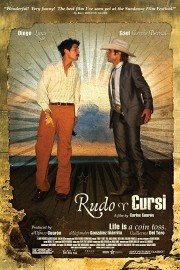Rudo y Cursi
In 2006, Mexican cinema became the cause celebre of critics with Across-the-Border auteurs’ Alfonso Cauron, Guillermo Del Toro, and Alejandro Gonzalez Inarritu hitting the artistic jackpot on bold imagination and bolder storytelling with “Children of Men,” “Pan’s Labyrinth,” and “Babel.” Of course, the three had been around for several years prior, but the impact of the three having such success in the same year was enormous. Studios clamored to be in business with them.
“Rudo y Cursi” is the first film seen with the Three Amigos’ seal of approval (via their partnership company Cha Cha Cha). Written and directed by Alfonso’s brother Carlos (he co-wrote his brother’s “Y Tu Mama Tambien,” and is making his directorial debut with this film), the film’s sibling rivalry story is a bit too slight to make much of an impact beyond a superficial one, but the film’s look at sports politics and the effect on the players who love the game is hard to ignore.
“Rudo y Cursi” is also a showcase for Diego Luna (aka Rudo) and Gael GarcÃa Bernal (Cursi), who are back together for the first time since “Y Tu Mama Tambien” as a pair of soccer-playing brothers from a small Mexican town, nicely hidden away from prying eyes, where almost as exciting as the game itself is the familial fighting the two see frequently in their dealings with step-fathers and wives who want to see them settle down instead of chasing unlikely dreams. But things change when an unlikely circumstance comes to town in the form of Baton (Guillermo Francella, who also serves as the film’s insightful narrator), a football talent scout who can take both brothers to the big-time. Cursi- the nickname Bernal’s Tato acquires in the big-time- is the first to go, with Rudo (Diego’s Beto) not far behind, but as Baton promises the brother’s the world, their lives personal lives (and life-long insecurities) begin to unravel, especially when the brothers face off against one another on the field.
While the film comes alive with the energy of the culture and passion of the game only the Mexicans can really emulate, it’s not hard to see this as a story that could happen anywhere, in any sport (Hell, “The Simpsons” did a similar story where Bart and Lisa were on rival junior hockey teams back in Season 6). But for a movie like this, the point isn’t how original the idea is but how heartfelt the execution is, and while the film benefits greatly from the chemistry and performances by Luna and Bernal (as well as the tone-setting narration, which sees soccer and brotherly rivalries as two sides of the same coin), Carlos Cauron’s direction isn’t quite as pointed or alive as Alfonso’s was with “Y Tu Mama Tambien.” That film brimmed with life and provocation. “Rudo y Cursi” is simply a simple and poignant story of brotherly love. That doesn’t mean it doesn’t get to some universal truths in the process.










